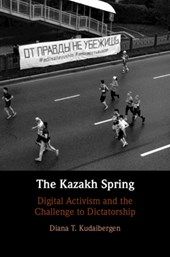
Protests and Pro-democracy Movements in Autocracies
How can decentralized protest movements challenge entrenched, repressive, and highly resilient authoritarian regimes? This question is central to Diana T. Kudaibergen’s groundbreaking new book, The Kazakh Spring: Digital Activism and the Challenge to Dictatorship. Together with renowned political scientists and sociologists we discuss the dynamics between authoritarian regimes and democratization movements – with a focus on Central Asia and Eastern Europe.
Using the context of the Kazakh Spring protests (2019–ongoing), Diana T. Kudaibergen addresses how the interplay between a repressive regime and democratization struggles define and shape each other. Combining original interview data, digital ethnography, and contentious politics studies, she argues that the new generation of activists, including Instagram political influencers and renowned public intellectuals, have been able to de-legitimize and counter one of the most resilient authoritarian regimes and inspire mass protests that none of the formalized opposition ever imagined possible in Kazakhstan.
Whilst taking The Kazakh Spring as a focal point, the panel discussion addresses broader questions about protests and pro-democracy movements in autocracies in Central Asia and Eastern Europe.
The panel is part of the Decolonial Dialogues Workshop that seeks to de-center the focus of Eastern European, Central Asian, and Northern Eurasian studies from a singular emphasis on Russia/Kremlin, instead amplifying diverse voices from these regions. The speakers address the resistance to discursive colonialism or scholarly discourse that reproduces power asymmetries and naturalizes them in people’s minds.
About the speakers
Diana T. Kudaibergen is a political sociologist and a new lecturer in Central Asian Politics and Society at UCL SSEES. She previously taught sociology at the University of Cambridge and International University in Turkmenistan. She’s the author of Rewriting the Nation in Modern Kazakh Literature (2017), Toward Nationalizing Regimes (2020), The Kazakh Spring (2024), and a forthcoming volume called What Does it Mean to Be Kazakhstani? to be published by Hurst London in the coming months. Kudaibergen is the author of numerous articles about nation-building and regime dynamics in Eurasia.
Assel Tutumlu, is an Associate Professor in Political Science at Near East University, Northern Cyprus. Her research explores the nature of authoritarian regimes in Central Asia and beyond, particularly looking into discursive and disciplinary practices. She appeared on Al-Jazeera, BBC, TRT World, and France24. Her work was published in Europe-Asia Studies, Central Asian Survey, Security Journal, Journal of Eurasian Studies, and Problems of Post-Communism.
Tereza Hendl is a philosopher and bioethicist. She currently works as a Postdoctoral Researcher at the University of Augsburg and Research Associate at the Ludwig Maximilian University of Munich. Her research investigates concerns of vulnerability, refusal, empowerment, justice and solidarity, and the ethics and epistemology of health technologies and interventions. Some of her latest work explores European East-West inequalities and their impact on health, also accounting for the impact of German and Russian imperialism. She is the founder of the Central and Eastern European Feminist Research Network, which supports CEE researchers and counters the epistemic marginalisation of CEE scholarship, and co-founder of the RUTA Association for Central, South, and Eastern Europe, Baltic, Caucasus, Central and Northern Asia Studies in Global Conversation.
Nodira Kholmatova (moderator) is a sociologist and a postdoctoral researcher at the Political Science Department, University of Amsterdam. Nodira researches return migration and deportation regimes and the impact of migration policies on migrants and their families. Her research areas focus on migration trajectories from Central Asia, and more recently, she has also been looking into Western Balkans and Southeast Asia. Her works are published in Political Geography, Advances in Life Course Research Journal (forthcoming).

:rgb(-15)

:rgb(-25)

:rgb(8)
